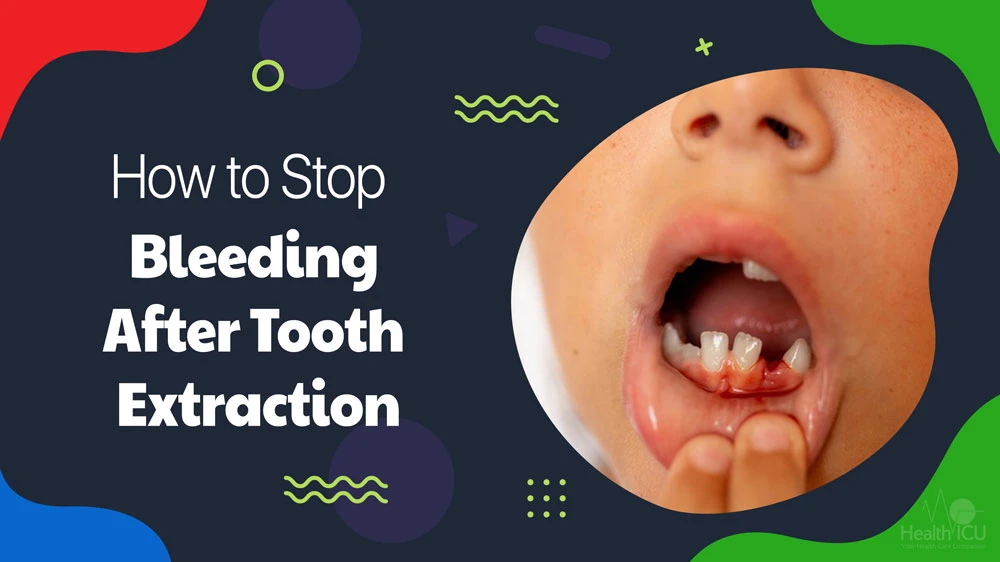If you have recently had a tooth extraction, you may experience some bleeding from the extraction site. This is normal and usually stops within a few hours. Sometimes the bleeding may persist or recur, which can cause discomfort and anxiety.
In this blog post, we will explain why bleeding occurs after tooth extraction, how to stop it at home, and when to seek professional help.
How to Stop Bleeding After Tooth Extraction at Home
The following are some home remedies that can help you stop bleeding after tooth extraction at home:
Apply Pressure with Gauze
This is the most effective and simple way to stop bleeding after tooth extraction. As soon as your dentist removes the tooth, they will place a sterile gauze pad over the socket and ask you to bite down on it firmly for 15 to 30 minutes.
This will help compress the blood vessels and form a blood clot in the socket. You may need to change the gauze pad several times until the bleeding stops. Make sure to use clean and damp gauze pads, and avoid touching the extraction site with your fingers or tongue.
Use a Cold Compress
Applying a cold compress to your cheek or jaw can help reduce swelling, pain, and bleeding after tooth extraction. Wrap an ice pack or a bag of frozen peas in a towel and hold it against your face for 10 to 15 minutes at a time, with 20-minute breaks in between. Do not apply ice directly to your skin, as this can cause frostbite. You can use a cold compress for up to 48 hours after tooth extraction.
Try Black Tea Bags
Black tea contains tannic acid, which is a natural astringent that can help contract the blood vessels and promote clotting. To use this remedy, wet a black tea bag in cold water and squeeze out the excess liquid. Place the tea bag over the socket and bite down on it gently for 20 to 30 minutes. You can repeat this process as needed until the bleeding stops.
Eat Soft and Nutritious Foods
Eating a balanced diet can help your body heal faster after tooth extraction. You should avoid foods that can irritate or damage the extraction site, such as nuts, seeds, popcorn, chips, crackers, pretzels, granola bars, etc. Instead, opt for soft and easy-to-chew foods that are rich in protein, vitamins, minerals, and antioxidants, such as:
- Yogurt
- Cottage cheese
- Eggs
- Oatmeal
- Mashed potatoes
- Soup
- Smoothies
- Applesauce
- Bananas
- Avocado
- Cooked vegetables
- Fish
- Chicken
- Tofu
Drink Plenty of Water
Staying hydrated is essential for your overall health and well-being, especially after tooth extraction. Drinking enough water can help flush out toxins, prevent dehydration, and promote healing.
You should avoid drinking water for at least an hour after tooth extraction, as this can wash away the blood clot. You should also avoid drinking water from a bottle or a straw, as this can create a sucking motion that can dislodge the blood clot. Instead, drink water from a glass or a cup, and sip it slowly and gently.
Take Painkillers and Antibiotics as Prescribed
Your dentist may prescribe you some painkillers and antibiotics to help you manage the pain and prevent infection after tooth extraction. Make sure to follow your dentist’s instructions on how to take these medications, and do not exceed the recommended dosage or duration.
You should also avoid taking aspirin or ibuprofen, as these can thin your blood and increase bleeding. If you have any allergies or side effects from the medications, contact your dentist immediately.
Avoid These Activities that Can Dislodge the Blood Clot
As mentioned earlier, there are certain things that you should avoid doing after tooth extraction, as they can interfere with the formation and stability of the blood clot. These include:
- Rinsing or spitting for at least 24 hours after tooth extraction
- Drinking hot, carbonated, or alcoholic beverages for at least 24 hours after tooth extraction
- Drinking through a straw or sucking on anything for at least 72 hours after tooth extraction
- Smoking or chewing tobacco for at least 72 hours after tooth extraction
- Eating hard, crunchy, sticky, or spicy foods for at least 72 hours after tooth extraction
- Brushing or flossing near the extraction site for at least 72 hours after tooth extraction
- Exercising or lifting heavy objects for at least 72 hours after tooth extraction
Why does bleeding occur after tooth extraction?
Bleeding after tooth extraction is caused by the disruption of blood vessels in the gums and bone around the extracted tooth. The body tries to form a blood clot to seal the wound and stop the bleeding, but sometimes the clot may be dislodged or dissolved by saliva, food, or drinks. This can result in prolonged or recurrent bleeding.
When to See a Dentist or Seek Emergency Care
Most cases of bleeding after tooth extraction can be managed at home with these tips. However, if the bleeding is severe, persistent, or accompanied by other symptoms such as fever, swelling, pain, or bad breath, you should contact your dentist or oral surgeon as soon as possible. These could be signs of infection or other complications that require immediate attention.
Conclusion
Bleeding after tooth extraction is common and usually stops on its own within a few hours. However, if it continues or worsens, you can try some of these home remedies to stop it and promote healing. If you have any concerns or questions about your recovery, do not hesitate to reach out to your dental professional for advice and guidance.



